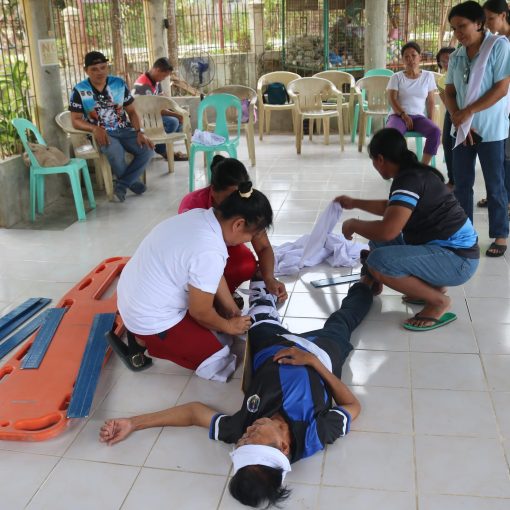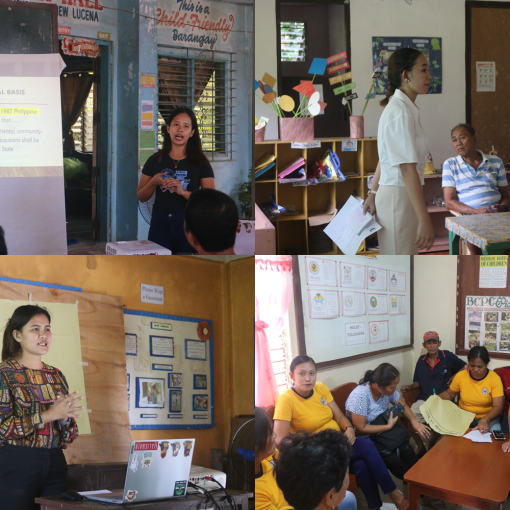There is something extraordinary, mind-boggling, and even “impossible” going on in Zarraga, a 4th Class municipality in the Province of Iloilo, Western Visayas Region, Philippines. A world-class innovation is arising from the ashes of neglect, poverty, mismanagement, and widespread apathy.
A new form of governance is beaming a brilliant light onto the firmament and across the dark horizon of Philippine politics and development. Together, highly motivated leaders from government, civil society, and business, as well as outside partners, are attempting something that has never been done before in the history of the Philippines. It may also be one of the few of its kind in the world.[i] These societal leaders are not only jointly reiterating a vision of inclusive and holistic sustainable development, they are intent in making all the seven dimensions of sustainable development happen, simultaneously and synergistically, not only in some parts of the town, but in the whole town of Zarraga.
The beginning results are robust, promising and exciting. The dynamic societal partnership among government, business, and civil society is inspired by a warm-hearted, charismatic, honest, walk-the-talk, results-achieving local mayor and an equally open, pro-active, strategic thinking and supportive legislative assembly. This new societal governance force in the town is now in the midst of intense efforts to transform a municipality that has been sleeping for over 20 years into one of the most dynamic towns in the region and the country.
Inspiring Achievements
Just consider what this convergence of societal players has achieved in less than a year. What follows is not a full listing but more illustrative of the unusual achievements. Important developments are happening not just in agriculture – the economic dimension of sustainability – but in other areas as well.
Zarraga is the only town in the Philippines to have developed a comprehensive and integrated agricultural program on the basis of a statistically representative sample of its entire farming population. On top of this, the town and its partners are currently implementing this innovative program in agriculture.[ii]
On August 10, 2014, the town had a “soft” opening of its Organic Trading Post (OTP). When it becomes fully operational towards the last week of September 2014, this OTP will be the first operational OTP for organic agriculture in the country.
On the same day, the town also inaugurated its convergence area for innovations in sustainability. The town calls this convergence place, GAIA, or Garden Area for Initiatives in Action. So far GAIA has thirteen initiatives. Four are currently functional and another six will be in place in three months. While the remaining three (plus others) will be operational within one year or less. GAIA has already attracted a few hundred visitors less than three weeks after it opened. Many of these visitors consider GAIA, including its larger development context, to be unique in the country.
Zarraga, due to its unique program in organic agriculture, as exemplified in the three bullet points above, was the kick-off venue of the 2nd Regional Summit on Organic Agriculture held from August 10-15, 2014.
The Department of Agriculture, Region 6 (Western Visayas) or DA6 has poured five million pesos into Zarraga’s OTP, GAIA, and other aspects of its agricultural program. DA6 has done this because it considers what is happening in Zarraga unique for the whole region. Among other reasons, Zarraga is the only town in the entire country aspiring to have all its agricultural lands converted into organic agriculture by the end of 2022.
The GAIA area is part of a larger development. Zarraga is creating a new town center, an eco-industrial-tourism zone. And GAIA is part of this new town center. This new town center came as a result of a Sustainable Integrated Area Development (SIAD) workshop facilitated by SEA. The mayor implemented the recommendations of the multi-stakeholder group one week after it gave its recommendations.
Because of its achievements and current efforts, a Philippine Senator chose Zarraga to be one of two areas in the Philippines where convergent development will be demonstrated. The beginning projects are worth a total of 8.5 million. The projects are dredging Zarraga rivers (5M) to make the town less prone to flooding and an expanded feeding program for the malnourished (3.5M), a program that will be consciously linked with the organic agriculture program of the town.
Upon the suggestion of civil society institutions, facilitated by SEA, both the mayor and the legislative assembly has agreed to pass an ordinance (a town law) with the following provisions, among others:
- Rename its development council, responsible for the strategic planning for the whole town, into “Zarraga Sustainable Development Council” (ZSDC).
- Increase the representatives from business and civil society in the ZSDC into a total of 15 representatives from its current seven representatives.
- Adapt integral sustainable development with its 7 dimensions as the framework for inclusive development of the town.
- Formalize societal governance as the governance mode of the town, thereby formalizing societal threefolding as its governance approach.
Because of its society-based governance innovation, Zarraga has leveraged an additional P44.2 million or more than 100% of its Internal Revenue Allotment (IRA) from the national government of P40 million. The vast majority of these new funds are for agriculture-related, identified through participatory processes facilitated by SEA.
SEA would like to emphasize that they, together with government and business leaders, did not engage in these projects to win prominence, but to help individuals and communities develop and gain their sense of purpose and dignity. The prominence came as a by-product of a passion to really make a difference in the lives of the poor of Zarraga, the residents of the town, and to contribute to an alternative working development approach that could potentially transform the Philippines.
[i] There are other systemic efforts in the world. However, most, if not all, are sectoral in nature. They are rarely, if at all, societal in nature, that is, encompassing all the dimensions of sustainability.
[ii] For more details, see all the related discussions on ZAP, the acronym for the poverty-busting, food-securing Zarraga Agriculture Program.




